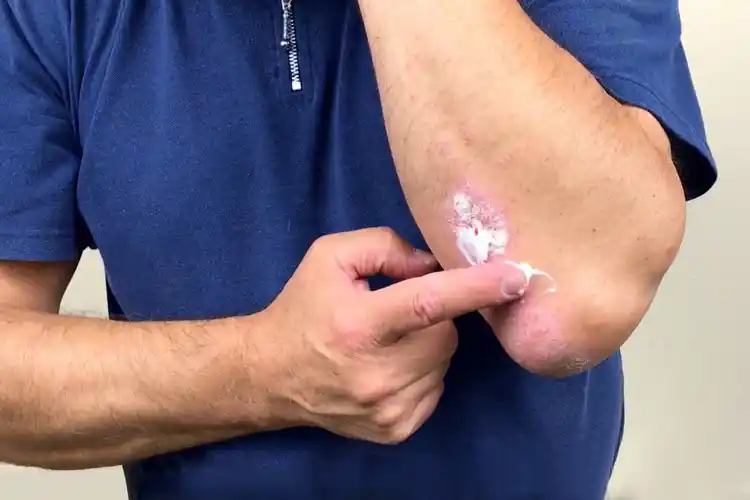Infection Prevention for Psoriasis

Hide Video Transcript
Video Transcript
[MUSIC PLAYING]
Here is where we use the topical medications, or the keratolytics. Keratolytics are medications or topical ointments and salves that we use to actually break down the heaping of keratinocytes, or cells, on the top of the skin. And that sloughing can stop the cliff-like surface of cells that are cracking, and also helps smooth the skin.
Staying moisturized is very important as well, extremely important when we have micro-cracks in the skin, because it kind of smooths the surface of the skin and fills in all the cracks so that there's less inflammation, but also less chance of microorganisms coming in and creating infection.
Another step in preventing skin infections would be to maintain good hygiene. I know we're washing our hands more now, but it would be important to wash our bodies. When you do take too-hot showers, that can be detrimental to your psoriasis, because hot water evaporates faster from the surface of the skin and can actually cause the skin or the psoriasis plaques to dry out. So taking lukewarm showers would be important, and moisturizing afterwards and using your dermatologist-prescribed medications.
It is important, though, to not wear too-tight fitting clothing, because it can lead to more irritation or maceration of the skin. There is a condition called inverse psoriasis, where people get psoriasis in their armpits or in their genital area. And when it is in a warm moist environment, that can lead to increased risk of skin infection.
PURVISHA PATEL
In psoriasis, there's a hyper-proliferation of the keratinocytes, or the uppermost layer of cells in the skin. And when the skin gets heaped upon itself and it's not shedding-- or it is shedding, but it's turning over so fast-- you can get cracks in the surface of the skin, just like you would see cracks in something dry, like a dry pavement. It cracks open. These cracks in the skin also make you more susceptible to infection, because our blood cells are exposed. And also, we have little wounds on the surface of the skin. So bacteria and organisms have more of a chance of going into the skin and creating skin infections. Here is where we use the topical medications, or the keratolytics. Keratolytics are medications or topical ointments and salves that we use to actually break down the heaping of keratinocytes, or cells, on the top of the skin. And that sloughing can stop the cliff-like surface of cells that are cracking, and also helps smooth the skin.
Staying moisturized is very important as well, extremely important when we have micro-cracks in the skin, because it kind of smooths the surface of the skin and fills in all the cracks so that there's less inflammation, but also less chance of microorganisms coming in and creating infection.
Another step in preventing skin infections would be to maintain good hygiene. I know we're washing our hands more now, but it would be important to wash our bodies. When you do take too-hot showers, that can be detrimental to your psoriasis, because hot water evaporates faster from the surface of the skin and can actually cause the skin or the psoriasis plaques to dry out. So taking lukewarm showers would be important, and moisturizing afterwards and using your dermatologist-prescribed medications.
It is important, though, to not wear too-tight fitting clothing, because it can lead to more irritation or maceration of the skin. There is a condition called inverse psoriasis, where people get psoriasis in their armpits or in their genital area. And when it is in a warm moist environment, that can lead to increased risk of skin infection.
